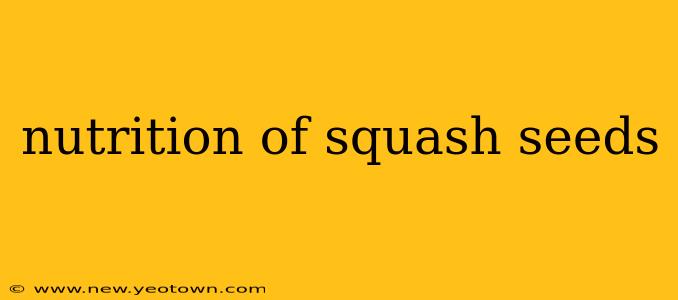Squash seeds, those often-overlooked treasures nestled within the heart of pumpkins, gourds, and other squash varieties, are nutritional powerhouses brimming with benefits. Often discarded, these little seeds pack a surprising punch of vitamins, minerals, and healthy fats, making them a worthy addition to any diet. Let's delve into the fascinating world of squash seed nutrition and uncover why they deserve a prominent place on your plate.
My journey into the world of squash seeds began with a simple observation – my grandmother, a woman of unwavering health and vitality, always saved and roasted them. Her secret? A sprinkle of salt and a generous dose of love, resulting in a crunchy, flavorful snack that was as delicious as it was nutritious. It sparked my interest, leading to years of research into the amazing benefits of these tiny seeds. This article reflects that research and personal experience.
What are the nutritional benefits of squash seeds?
Squash seeds boast an impressive nutritional profile. They're a fantastic source of:
-
Healthy Fats: Rich in monounsaturated and polyunsaturated fats, including omega-3 and omega-6 fatty acids, crucial for heart health and brain function. These fats are essential, meaning our bodies can't produce them, so we must obtain them through our diet.
-
Protein: A good source of plant-based protein, making them an excellent addition to vegetarian and vegan diets. This protein contributes to muscle building and repair, and overall satiety.
-
Fiber: Contributes to digestive health and helps regulate blood sugar levels. Fiber also keeps you feeling full and satisfied for longer.
-
Minerals: Squash seeds are packed with essential minerals such as magnesium, zinc, iron, and manganese, all vital for various bodily functions. Magnesium supports muscle and nerve function, zinc is crucial for immune function, iron supports oxygen transport in the blood, and manganese aids in bone health.
-
Vitamins: They contain various vitamins, including vitamin K, a key player in blood clotting and bone health, and vitamin E, a potent antioxidant that protects cells from damage.
Are squash seeds good for weight loss?
Yes, squash seeds can contribute to weight management. Their high fiber and protein content promote satiety, helping you feel fuller for longer and reducing overall calorie intake. However, like any food, moderation is key. While they're nutritious, they are also calorie-dense, so portion control is essential.
What are the health benefits of eating squash seeds?
Beyond the individual nutrients, the combined benefits of squash seed consumption are remarkable:
-
Improved Heart Health: The healthy fats and magnesium content contribute to lowering blood pressure and reducing the risk of heart disease.
-
Enhanced Immunity: The zinc and vitamin E work together to bolster your immune system, protecting against infections.
-
Better Sleep: Magnesium plays a crucial role in regulating sleep cycles, potentially improving sleep quality.
-
Improved Digestive Health: The fiber content supports regular bowel movements and prevents constipation.
How many squash seeds should I eat per day?
A serving size is typically around 1/4 cup (about 28 grams) of shelled squash seeds. This amount provides a good dose of nutrients without exceeding your daily calorie goals. Remember, moderation is key to reaping the benefits without negative consequences.
Are there any side effects of eating squash seeds?
While generally safe, consuming excessive amounts of squash seeds can lead to digestive discomfort such as bloating or gas due to their high fiber content. Additionally, those with allergies to other seeds or nuts should exercise caution, as cross-reactivity is possible.
How to Incorporate Squash Seeds into Your Diet
There are countless ways to enjoy squash seeds:
-
Roasted: Toss them with a little olive oil, salt, and your favorite spices, then roast until golden brown for a delicious snack.
-
Added to Salads: Sprinkle them over salads for a crunchy and nutritious boost.
-
In Breads and Muffins: Add them to your favorite baking recipes for extra texture and nutritional value.
-
Ground into Flour: Blend them into a powder to use as a flour alternative in certain recipes.
-
Sprinkled over Yogurt or Oatmeal: A quick and easy way to add a boost of nutrition to your breakfast.
The humble squash seed, often overlooked, is a culinary treasure trove waiting to be discovered. By understanding their nutritional profile and incorporating them into your diet mindfully, you can harness their power to improve your overall health and well-being. So next time you carve a pumpkin or prepare a butternut squash, don’t forget the seeds – they’re a small investment with big rewards.

